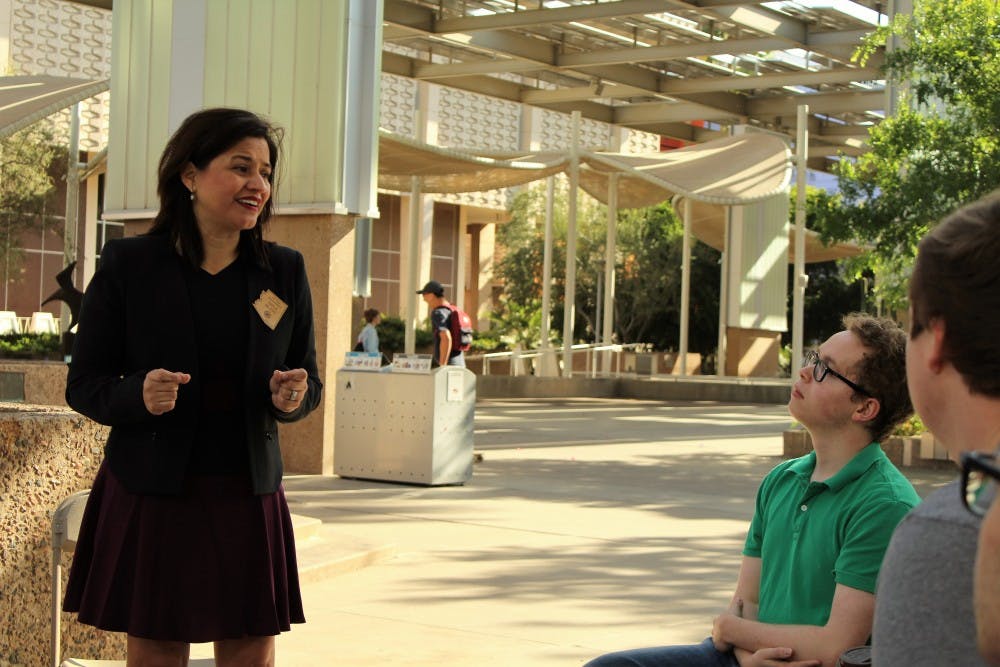Rep. Isela Blanc (D-Tempe) had a message to students Friday: You can impact change in politics, even with just a tweet.
The Legislator Breakfast, organized by ambassadors from the Andrew Goodman Foundation, was an opportunity for students to talk to Blanc and Rep. Michelle Udall (R-Mesa) about topics ranging from student civic engagement to working in college. The Andrew Goodman Foundation is an organization that promotes civic engagement on college campuses
About 15 students had a chance to talk with the lawmakers at the event held in front of the Memorial Union on the Tempe campus.
Blanc highlighted student engagement, noting that one student was partially responsible for killing a bill written by state Rep. Bob Thorpe (R-Flagstaff).
House Bill 2120 would have resulted in Arizona colleges and universities being penalized 10 percent of their funding for teaching any classes that promoted “solidarity or isolation based on ethnicity, race, religion, gender or social class instead of the treatment of students as individuals.”
HB 2120 died in the legislature after not being heard by the House Education Committee.
At the time, Thorpe reportedly disconnected his office phone, something reinforced by Blanc at the breakfast on Friday.
Read more: Arizona legislator takes aim at University students in first week of session
“You (students) have been able to kill Thorpe’s bill,” Blanc said in response to a question about how students can be more engaged in politics.
She praised one student's effective use of social media: political science and public policy junior Randy Perez.
After the bill was introduced, Perez tweeted out Thorpe's phone number. Blanc said that Perez’s tweet was the catalyst that led to Thorpe's phone being disconnected.
Students: CALL Bob Thorpe's office at 602-926-5219
— Randy Perez (@therandyperez) January 13, 2017
Tell him that we STRONGLY oppose and will FIGHT HB 2120 and HB 2260! ✊ https://t.co/47rJlfYnnR
“HB2120 was the bill that would cut university funding if schools taught ethnic studies or social justice classes, or had events of this nature on campus,” Perez said in an email. “I was opposed to this because of the sheer ignorance of the bill; these classes are not designed to divide us, they are built to empower traditionally disenfranchised groups with the knowledge of their own history, and the current struggle for justice.”
Perez said that HB 2120 began picking up national attention after the New York Post wrote an article about the controversy surrounding the bill. That article was tweeted out by State House Minority Leader Rep. Rebecca Rios (D-Phoenix), a “good friend” of Perez.
“At the time, this article was blowing up and getting national attention on Twitter,” Perez said.
He said he quoted Rios' tweet and included Thorpe's number as a "call to action" for students. Perez said the tweet began to gain momentum, and Thorpe’s office eventually received so many calls that his office was forced to unplug their phones.
“His office was so inundated with calls they pulled their phones out of the wall,” Perez said. “My tweet wound up with close to a thousand retweets, and in short order, the bill was pulled without even receiving a vote in committee.”
Blanc confirmed that Thorpe’s office was bogged down with phone calls after the tweet.
“You guys are millennials, so you’re very social media savvy,” Blanc said. “Don’t be intimidated, we’re people just like you and we need to stay connected.”
Vice President of Policy for Undergraduate Student Government Downtown Jimmy Arwood said lawmakers can do more to connect with students.
“Students don’t need to be experts,” Arwood said. “They just need to reach a certain threshold where they understand some of the basic premises of why things are the way they are.”
Arwood said he would instead direct policymakers to do more to reach out to younger people.
“I’m not one to believe that students don’t care because of apathy," Arwood said. "I think it’s because they genuinely don’t feel heard by the current system and those who represent them."
Reach the editor at politics.statepress@gmail.com or follow @chriswood_311 on Twitter.
Like State Press on Facebook and follow @statepresss on Twitter.




